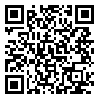BibTeX | RIS | EndNote | Medlars | ProCite | Reference Manager | RefWorks
Send citation to:
URL: http://refahj.uswr.ac.ir/article-1-1845-en.html
Objectives: Injecting heroin is the most common documented reason for HIV infectious in IRAN. Drug Injection is the most common type of misusing opiate in homeless addicted persons. Different studies found that there are specific relationships between drug abuse, injecting with shared needles and other risky behaviors which are related to HIV infection and personality and behavioral characteristics such impulsivity.
Method: According to high prevalence of heroin injection in homeless opioid dependents in Tehran, Iranian Police Force in cooperation with Drug Court and Ministry of Health, systematic intervention in homeless people in city of Tehran’ project, perform a methadone maintenance program for these people for 3 months in Shafagh rehabilitation center. In duration of therapy, some serologic examinations were done for diagnose and perform next interventions because of acquisition of HIV Infectious. This research was designed to examine and compare of some behavioral scales between 2 groups (HIV+ and HIV-) before accomplishment of therapy. 52 persons selected in this research (25 HIV+ and 27 HIV-) and Barret Impulsiveness Scale, Eysenck Impulsiveness Questionnaire, Delay Discounting Task, demographic information form and clinical interview performed for gathering databases.
Finding: HIV infectious was related to injection drug history; in addition, HIV infectious was related to prison history. The difference in impulsivity scale of Barret and Eysenck Questionnaires between 2 groups was significant.
Results: the high rate of impulsivity and probability of sharing needles in injection drug users in compare of other injection drug users leads to progressing AIDS. High rate of impulsivity and sharing needles are two most important anticipations for acquisition of AIDS.
Received: 2015/08/21 | Accepted: 2015/08/21 | Published: 2015/08/21
| Rights and permissions | |
 |
This work is licensed under a Creative Commons Attribution-NonCommercial 4.0 International License. |





